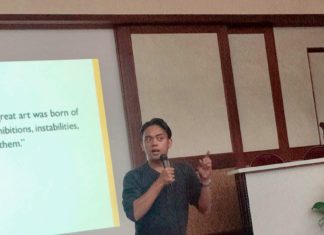UST professors have recently called on administrators to retain Filipino and Panitikan subjects in the UST curriculum in college.
This comes after the Supreme Court affirmed the decision of the Commission on Higher Education (CHEd) to make the subjects offered optionally in the tertiary level.
It is a shame that the very institutions that should be leading the cause for the improvement of education in this country have commodified it, thanks to the faulty implementation of the K-12 and of the outcomes-based curriculum.
This decision will surely and effectively kill the soul of this nation–our own language and literature, as well as our Constitution which have been made optional too in college.
No less than CHEd will have blood on its hands for raising students who are only trained in the technical courses but not in their own own culture and language. It should not cost us the further weakening of the appreciation and understanding of our own language and literature for the sake of producing globally competitive–that is, capitalist-driven–graduates.
It comes as no surprise, therefore, how generations of Filipinos are forgetful and even ignorant of their own history because it is the very people in power that allow the rotten system to prevail.
Neighboring countries in the Asian region have always put their own culture, history and language as priorities, as these make students understand their identity. It is no wonder how Filipinos allow themselves to submit to powerful countries such as Beijing and Washington–it is because they have no sense of being what it is to become a Filipino.
Further, this decision will put to danger the employment of thousands of Filipino and Panitikan professors, as if they have not been affected enough by the onset of the K-12.
UST’s professors from the Filipino and Literature departments have been quick to denounce this decision, and they were right in doing so.
The preservation of our language and literature, after all, falls not only on the shoulders of the University but of its academe and students as well. Both should see to it that the objectives of these classes are realized, that the Filipino language and Panitikan are indeed enriched, and not only taught or understood for the sake of compliance.
UST’s academic affairs chief Cheryl Peralta said UST was in consultation with deans on the matter.
The UST administration should remember that the conservation of Philippine languages was a legacy of its alumni, notably Manuel Quezon and Norberto Romualdez Sr. It is home to many National Artists for Literature, and was even chosen as the home of the Komisyon sa Wikang Filipino’s Sentro ng Salin.
It would spell out a total disgrace and ignominy should this institution drop Philippine language subjects in the UST curriculum.
As the country’s oldest university, UST has always been witness to history. UST has seen the decay in cultural and historical institutions and it has always been at the front line of advocating for their preservation. Therefore, UST should uphold Philippine languages because it is in speech that culture and civilization is reflected and embodied.












